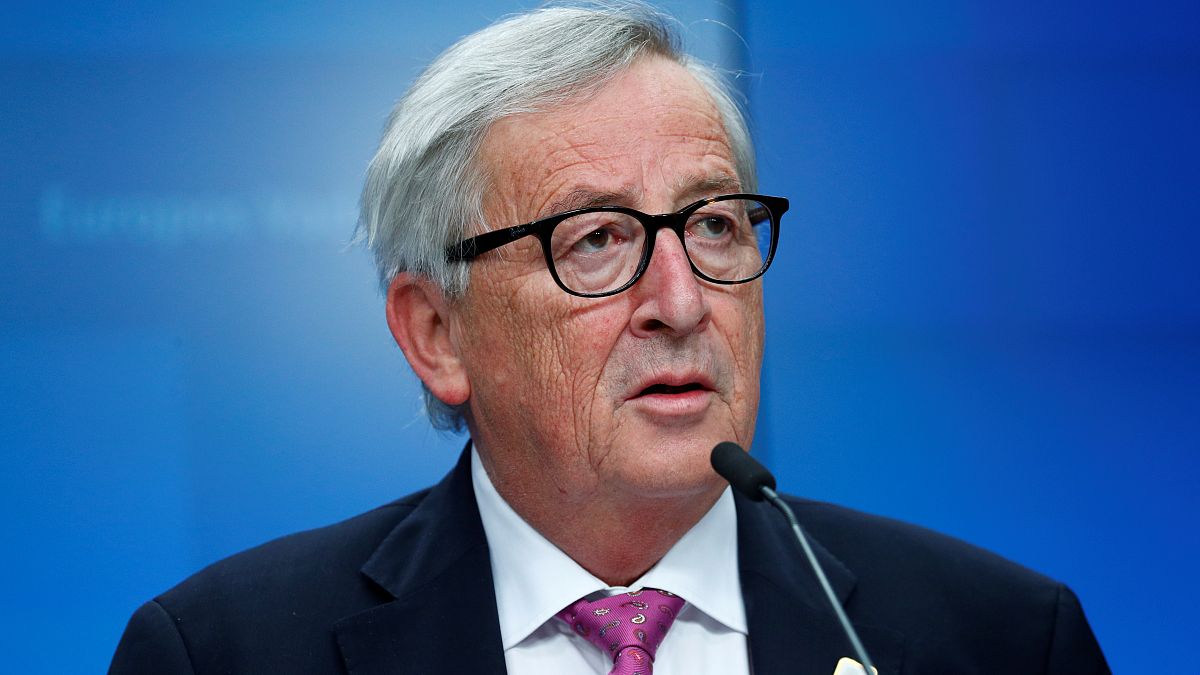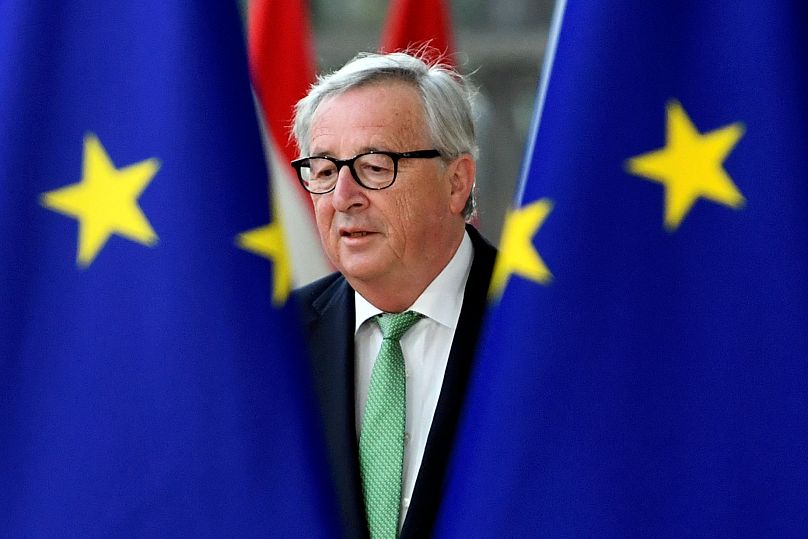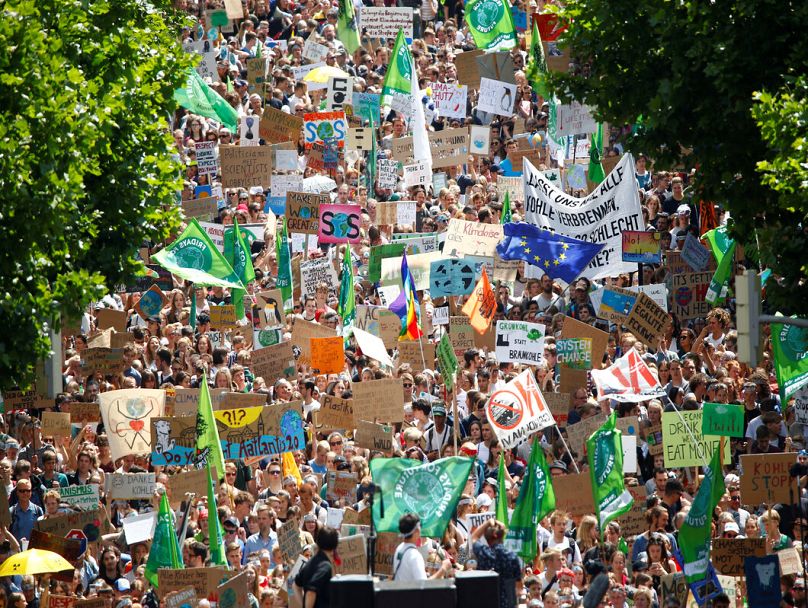More than one month after the European Parliamentary elections, there seems little sign of agreement between parliamentary groups or between member states' leaders on who should replace Jean-Claude Juncker as the president of the European Commission.
The latest EU leaders summit has broken up in Brussels without an agreement on who should take over the bloc's top jobs.
The group's failed to reach an agreement about the five top EU jobs including the Presidents of the European Council and of the European Commission during the meeting which ran until 2am CET on Friday morning.
The logjam could also delay appointments to other major roles such as President of the European Central Bank and the High Representative of the Union for Foreign Affairs.
Watch Euronews' Jack Parrock's report by clicking on the player above.
Five key takeaways
1. What happens next?
Outgoing European Commission President Donald Tusk says he will organise another summit on 30 June to try to agree on a candidate before July 2 when the European parliament's new MEPs sit for the first time.
The bloc’s five top jobs are still up for grabs: Presidents of the European Commission and European Council, foreign policy chief, speaker of the European Parliament and Director of the European Central Bank.
To win the top job as President of the European Commission, a candidate must first be nominated by a qualified majority of the European Council – 21 national leaders — then win approval by a majority of the European Parliament, or 376 of the 751 MEPs.
In previous years, the largest political grouping in the parliament shapes the Commission, but the European election results have left no political grouping with a clear majority.
The two main groups have lost their majority for the first time in the history of the parliament as voters moved towards pro-European alliances, Greens or populist anti-EU parties.
This has been made worse by disagreements between France and Germany.
At previous summits, Franco-German hegemony has built support around a single, favoured candidate.
But this time, Chancellor Angela Merkel, who supports centre-right technocrat Manfred Weber, and President Emmanuel Macron who has floated other candidates including centre-left Frans Timmermans, Brexit negotiator Michel Barnier or Competition Commissioner Margrethe Vestager.
Efforts to win a compromise took a further hit earlier this month when Macron’s ally in Brussels, French liberal group leader Nathalie Loiseau, reportedly last week dismissed Weber as "ectoplasm."
2. The B-word
Having agreed a non-negotiable extension to the UK’s Article 50 deadline for leaving the EU until October 31, European leaders had been looking forward to their first summit in years where Brexit was not on the agenda.
However, as the UK's EU membership was extended to October 31, EU leaders agreed at their European Council summit in April to review progress at this June gathering.
The final two candidates to be the UK's next prime minister have both suggested they will seek further negotiations over the Irish border backstop.
The current favourite to succeed May, former foreign secretary Boris Johnson, has said he plans to leave the EU with or without a deal on 31 October while his rival, the current foreign secretary Jeremy Hunt, says it was wrong to consider the deadline a "hard stop" and wants to continue negotations.
At the final press conference of the EU Summit, President of the European Council Donald Tusk and President of the European Commission Jean-Claude Juncker reiterated the withdrawal agreement was not open for negotiation.
"On the issues concerning Brexit there was nothing new. Nothing new because we repeated unanimously that there will no renegotiation of the withdrawal agreement," said Juncker.
The EU27 leaders also said they looked forward to working with the future British prime minister, want to avoid a disorderly Brexit, and establish a close relationship with the UK, said Tusk.
3. Climate change
The EU Council conclusions on Thursday were also notably missing the ambitious target of achieving carbon neutrality by 2050 after facing opposition from eastern states including Poland and the Czech Republic. It was instead relegated to a footnote that reads: "For a large majority of Member States, climate neutrality must be achieved by 2050."
Greenpeace blamed French President Emmanuel Macron and German Chancellor Angela Merkel for failing to get the unanimous support needed.
"Merkel and Macron failed to convince Poland and bring others on board. With people on the streets demanding action and warnings from scientists that the window to respond is closing fast, our governments had a chance to lead from the front and put Europe on a rapid path to full decarbonisation. They blew it," said EU climate policy adviser Sebastian Mang in a statement on Thursday.
Eight countries are pushing for a firm commitment to the ambitious draft climate plan for 2050. Cyprus, Denmark, Latvia, Luxembourg, the Netherlands, Portugal, Spain and Sweden all want to send a “strong message” of European leadership ahead of a landmark United Nations summit in September, according to Euractiv.
Theresa May also committed the UK to being completely carbon neutral by 2050 as one of her final acts as prime minister last week.
However, other member states, including Estonia, Hungary and Poland, want to stick to existing targets and say the deadline for climate neutrality — zero emissions — should be softened to “mid-century” rather than the explicit date of 2050.
A recent audit showed the EU is on track to meet its headline pledge of cutting emissions by 40% by 2030. However, there is concern that tough new targets will hurt competitiveness and cost jobs.
4. Cyprus-Turkey tensions
Speaking during their press conference after the summit broke up in the early hours of Friday morning, Jean-Claude Juncker and Donald Tusk spoke about the territorial conflict between Cyprus and Turkey.
The two countries have had no diplomatic relations since 1974 when Turkey annexed the northern half of the island and called it Northern Cyprus in response to an attempted annexation of the entire island by Greece.
To this day Turkey controls the northern half of the island but it is not recognised as an independent country by anyone other than Ankara.
But the conflict has reached breaking point in recent days after Turkey sent ships to begin oil and natural gas exploration in the disputed waters in Cyprus' Karpas peninsula.
Juncker said the European Commission was developing ways to respond to Turkey's actions which he said were "unacceptable" and resolve the conflict but said there would not be "soft measures".
5. Budget deal
The European Commission wants EU27 leaders to “make a push in advancing the negotiations on the EU's next long-term budget 2021-2027” so that a final deal can be reached by autumn.
It wants to avoid a repeat of the last process in which approval “was adopted six months too late, “having negative consequences for many citizens, in our member states and beyond.”
But a way forward cannot be reached until the candidates for the top jobs are decided.
When asked why he thought it was more likely they would come to agree on June 30 when they had not on June 20 Juncker said he did not think they would be but that is what they have to do.
Watch our briefing on day one of the summit and Darren's latest analysis in the video player above.
Watch Euronews Brussels Correspondent Jack Parrock chat with European journalists below.


